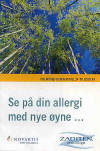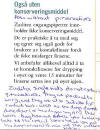Laboratories'
awareness of the preservative issue
One has to recognise that not all
laboratories are the same speech regarding preservative, however, all
recognised to some extend that there is a problem related to
preservatives. Some laboratories have completely eliminated preserved
products from their brands of drops and gels. That is the case, for
instance, of Théa and Horus-Pharma who committed themselves to the
production of either single-use vials or unpreserved bottles.

On the left, here's a warning on
preservatives by Théa (English version), which
one may find in the insert contained in the packages of their products.
It states: "ABOUT PRESERVATIVES: Eye drops are a
solution intended for instillation into the eye. This type of solution
must be kept sterile in order to avoid the risk of microbial
contamination of the eye. In order to ensure that sterility, most eye
drops contain an antimicrobial agent known as a preservative. However,
this type of product can cause allergic and/or toxic reactions on the
surface of the eye and in the tear film; these conditions result in
itching, burning sensation or watering of the eyes, and more generally
in a feeling of discomfort. This intolerance is increased by prolonged
use of the eye solution in question, which can occur with a long-term
treatment for conditions such as dry eye [note from the editor, this
sentence is sometimes replace by the following alternative ending: "such
as allergic conjonctivitis". The ABAK®
concept allows the instillation of eyedrops,
preservative free."
Vision Pharma advises the following on their website:
http://www.visionpharm.com/prodfeat.html
"NO preservatives.
Preservatives in eye drops are known to cause irritation and damage
normal healthy tear constituents. The formulation and manufacturing
process of
VIVA-DROPS® achieves
microbiological acceptance standards for ocular products without the
need for a preservative."
Others have expressed more delicate
shades of speech not to mention
a contradictory one. The logic usually being that their preservative is
less damaging than that of the competition (bellow you'll see an example
from Allergan towards Alcon). These
comparative studies are a way to
acknowledge that there is a problem.
See bellow excerpts of explanatory
brochures by Novartis regarding dry eyes in Norwegian. Let us remind you
that dry eyes or lachrymal dysfunctions require the frequent long-term
use of eye drops.



Central page: « What do preservatives mean? High
consumption of eye drops with preservatives is not good for the eyes and
long-term use may cause damage to the corneal cells. For that reason,
you should choose products without preservatives whenever possible.»
Page on the right: “It’s especially important to
choose tear substitutes without preservatives when you: use contact
lenses, have sensitive eyes, are allergic to preservatives, use
regularly other eyedrops with preservatives, high consumption of tears
substitutes”.
Bellow, a brochure by Novartis on allergic
conjunctivitis in Norwegian. Reminder: Allergic conjunctivitis may
require long-term treatments.



Central page: « Also without preservatives: Zaditen
single vials do not contain preservatives. They are practical to carry
and they are also suitable for contact lens uses – as drops do not (dis)colour
the lenses. Anyhow, we advise you to always take out the contact lenses
before putting the drops before putting them back on”.
Page on the right: “Long-term use of eyedrops with
preservatives may cause damage to the cells of the cornea. Therefore, if
possible, choose a product without preservatives”.
Bellow a brochure made for Allergan (New Zealand).


In the "How to relieve dry eye" section, “Single-use
vials – These are preservative-free and are ideal for people who are
sensitive to or concerned (SIC!) about preservatives, or who only
require eye drops occasionally”. We find this advice rather curious
since not using preservatives shouldn’t be motivated by the patients’
concerns as such but based on concerns as a result of studies
demonstrating the consequences of preservatives. This actually shouldn’t
the patients’ concern, but that of the laboratories which are supposed
to do pharmacovigilance independent studies on this matter. The last
sentence is also incorrect since it’s mainly frequent use (and not only
occasional use) that certainly requires the use of single-use vials.
In the “A guide to lubricant eye drops" section:
“Most multidose lubricant eye drops use two types of preservatives:
Detergent preservatives – such as
benzalkonium chloride and Polyquad® may be toxic to the eye and damage
the eye by breaking down cell membranes.
Oxidative preservatives – such as Purite®
used in Allergan’s Refresh Tears Plus® and Refresh Liquigel® lubricant
eye drops, are kind on eyes and break down into the natural components
of tears (water, oxygen and salts).
Purite® preservative is kind on eyes".
In the mild-to-moderate dry eye section, the
brochure advises two of Allergan’s products, which contain Purite®
preservative, but also the preservative-free Refresh Plus® single vials
that "are also suitable for use with contact lenses".
In the moderate-to-severe dry eye section, the
brochure only advises one preserved product containing Purite® but 2
unpreserved products including “Lacrilube® preservative-free ointment [,
which] is ideal for overnight treatment. Medecines have benefits and some
have risks”.
One can reach several conclusions: Allergan confirms
the risks posed by preservatives, notably detergent ones (including the
above-mentioned quaternary ammonium such as benzalkonium and Polyquad®
which can be toxic and damaging to the eye). Allergan seems to confirm
that contact lenses use combined with preservative use is an additional
risk (for the lenses but also to the eye since lenses prolong retention
time of the preservative at the surface of the eye).
In Pfizer's
Canadian website, a new unpreserved Visine is presented in its new formulation
without benzalkonium thanks to an unpreserved container (as opposed to the majority of the Visine line
unfortunately).
The website mentions that "Preservatives contained in multi-dose
bottled products have been shown to be sensitizing to some individuals".
Actually, to consider the preservative problem as a sensitisation for
some individuals
problem means eluding part of the problem and notably the cytotoxic and
tearfilm disruption effects of preservative. However, it's a first step
towards the recognition that something must be done to ban benzalkonium
from eye drops.
See
http://www.pfizer.ca/english/our%20products/consumer...questions/eye%20care/default.asp?s=1
Some companies, Focus Laboratories and the Dry Eye
Company, commercialise a new type of preservative (polexitonium) and
claim its safety for dry eye drops. Focus Laboratories claims
"FreshKote® has a unique
preservative that is not only harmless to the eye but also makes the
ocular surface more wettable, just the opposite of what some other
preservatives do" in
the following webpage
http://www.freshkote.com/FAQ.asp.
However, no clinical independent data supporting this claim has
been provided. Other limited information we received on this
preservative (cf, Consequences
Per
Preservative) mentions "very
low toxicity", which cannot be deemed to support the harmless claim for
long-term use let alone the increase wettability claim... in our
opinion.
This is what we call the 'Preservative Paradox!
Preserve
our Eyes, not our Drops!
▲

copyright © Keratos 2007